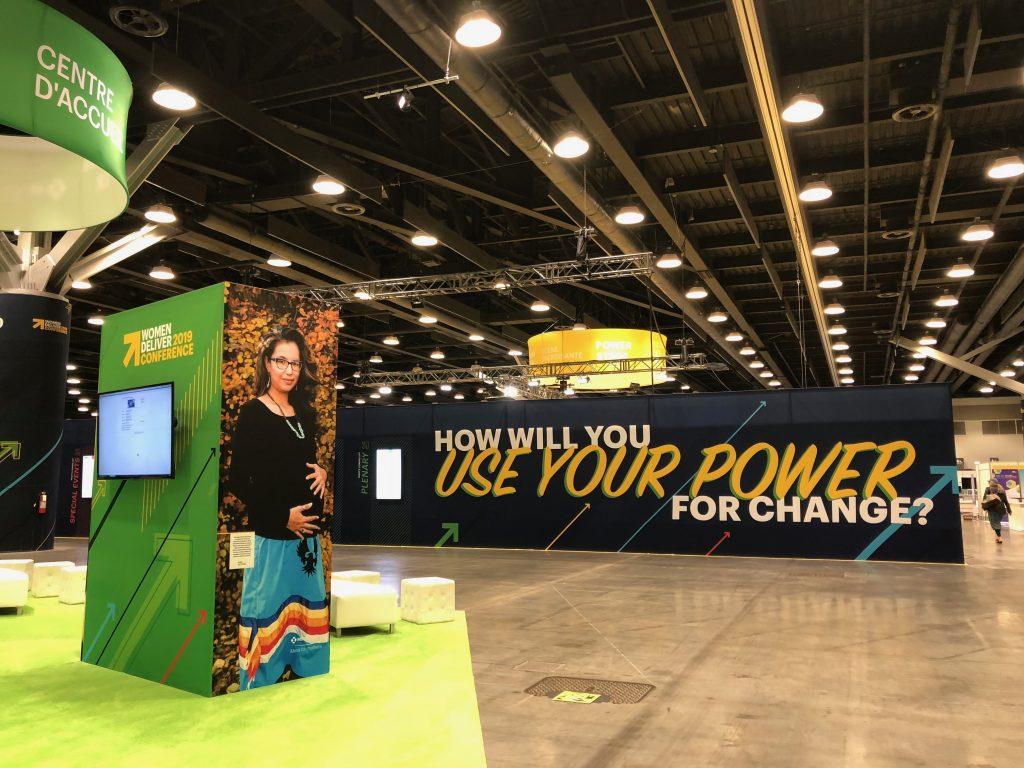The question that Women Deliver 2019 kept asking was “How will you use your power?” to inspire the participants, 8,000 strong from 165 countries, to continue the fight for gender equality and justice. I was really inspired by the community, the energy and hope, which is sometimes tough these days as it seems like two steps forward, one step back, or heartbreakingly in reverse, one step forward and two steps back. The passion of the speakers, the participants and really the youth leaders inspired me that even with some of the steps back, we would be in a worse situation if we did not keep pushing forward.
As much I loved the event, how I will use my power is to keep questioning those lines of power. My critique of the event was that it was too binary: men versus women. Even though some said that this was not a zero sum game, it still conceptualized human rights as individualistic. Improving the ability for women to make their own decisions seemed to be a recurring theme in many sessions. We could solve world hunger, world poverty, world peace, climate change and other urgent issues of our time if only women were making decisions for themselves. However, a prickly example is the rising global rates of caesarean deliveries, driven in part by demand by women, and educated women with higher socio-economic status and more antenatal care visits at that! I have noticed that at Women Deliver 2019, as well as at the recent FIGO World Congress 2018 (international meeting of gynaecologists and obstetricians), the conversation often then takes a paternalistic and patronizing turn: these women just need more education to realize their mistaken perceptions and fears. Without going into too much depth, some studies have shown how important perceptions of quality of care are for caesarean use and my guess is that dramatic increases in private facilities in low- and middle-income countries are likely where the public system is perceived as dysfunctional.
In bringing the individual focus broader to the social and systemic, I borrow from Alicia el Yamin (2015), an inspiring global health human rights lawyer and advocate who argues that the way that the public continues to think about human rights is often too limited. A narrow liberal paradigm of human rights focuses on individuals as autonomous actors. This led to a focus on civil and political human rights that enshrined the protection of the individual from interference of the state. Vivid examples of this include protection against torture, unjust arrest and confinement, even underlying the current arguments against anti-abortion laws as interference on a woman’s bodily autonomy. While it seems easier to build momentum on a simplified conceptualisation of human rights, the flip side is the undervaluing of social, economic and cultural rights as “programmatic”. In other words, the rights to work, health and education are great to include into programming and aspirations but not necessarily legally accountable as a part of the justice system.
As Alicia el Yamin argues, human rights are inherently social. They pop up in the interactions between people, governments and systems. Inequalities are at the foundation about relationships. As she argues and anthropologists have long described, people are not islands but are nested in communities and identities, in the web of meanings and relationships that people weave around themselves. Within human rights for health, it is building capacity of people within accountable and equitable communities and systems.
To take a personal example, though I consider myself a fairly empowered woman working in gender and global health, I rarely make decisions about my life and health completely on my own. My husband and I make decisions together because we are a family. Perhaps the difference between my example and others where the low status for women is a significant barrier to well-being is that our situation is not one-directional: we discuss, explore, compromise and sometimes argue in decisions for me, him and us. I feel like we need to build capacity for empowering people in partnerships, rather than simply individualistic decision-making. People are rarely completely autonomous but nested in relationships and communities, which in my opinion is what “intersectionality” is all about.
Empowering women through a focus mainly on autonomy (and support of male allies that often feels like an afterthought) not only superimposes a narrow liberal paradigm of rights and individualism into a global setting where there may be cultures and communities that put greater value on interdependence, but also has an element of blame as if it is within their power and responsibility to shift structures of inequity that constrain them. Women Deliver was fantastic but I think we can do more to build more realistic and intersectional conceptualizations of empowerment.

Views are my own and not necessarily those of my project teams or UBC